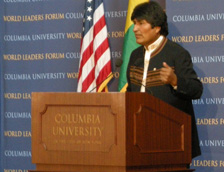Jeff Seelbach

Juan Evo Morales Ayma, President of Bolivia, spoke in New York on Tuesday as part of the Columbia University World Leaders Forum. Morales, the first indigenous president in Bolivian history, was elected in 2005. In September of this year, he kicked out the U.S. Ambassador to Bolivia, accusing him of conspiring against the Bolivian government, and America followed suit by expelling the Bolivian ambassador. Diplomatic relations deteriorated further this month when Morales suspended the Bolivian operations of the U.S. Drug Enforcement Agency (DEA).
Morales has accused both the U.S. Ambassador and DEA agents of involvement with his political opponents as justification for their expulsion. In his address at Columbia, Morales recounted recent stories of U.S. intervention in Bolivian affairs. Earlier this year, U.S. Embassy officials asked members of the Peace Corps and a Fulbright scholar to keep tabs on Cubans and Venezuelans in Bolivia. In 2002, then-U.S. Ambassador Manuel Rocha warned that a Morales win in the 2002 Bolivian presidential election could threaten U.S. aid to the country. Considering this history, Morales said he felt justified in his accusations of the Ambassador and DEA agents. However, he emphasized that he wants to improve the relationship between Bolivia and the U.S., and invited the audience to help him. He said that Bolivia is a poor country that needs help and investment, and he wants to encourage cooperation, as long as the cooperation is transparent.
In addition to addressing the current diplomatic conflict, Morales spoke more broadly about democracy in the Americas, the history of the Bolivian coca grower’s movement and his political party (MAS, the Movement Toward Socialism), and the major events of his presidency. Among those events is the controversial 2006 nationalization of the country’s hydrocarbon industries (mostly natural gas, but also including oil). Morales said that his nationalization plan brought much-needed revenue to the country and took Bolivia from a financial deficit to a financial surplus in only one year. Before nationalization, Morales said, Bolivia earned about $300 million from hydrocarbons per year; in 2007, the country received about $2 billion.
No doubt that 2008 has been tense for Bolivia and President Morales. While opposition has been vocal and even violent in recent months, this year Morales did overwhelmingly win a national referendum on his government’s performance. Unfortunately, the next few months probably won’t get easier. Morales’ plans for re-writing the Bolivian Constitution come up for a national vote on January 25, 2009. If he wants to ease the tension, maybe another appearance on The Daily Show would help.
Before Evo Morales was elected President of Bolivia, WIDE ANGLE reported on his activities as an organizer of coca growers in Coca and the Congressman.
